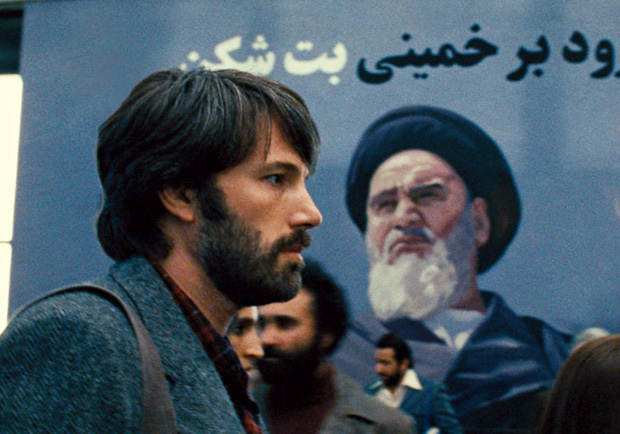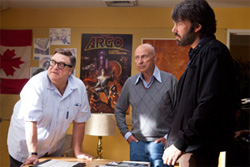Like everyone who was alive during the 1979 Iran hostage crisis (I was eight), I remember the rising count of days the 52 Americans spent in captivity, the ominous pictures on TV of angry Iranians spouting their grievances, the yellow ribbons tied everywhere to express our national concern.
But what most of us weren’t aware of during those tumultuous 444 days were that six Americans had sneaked out of the U.S. Embassy in Tehran in the midst of the takeover, and took refuge in the Canadian ambassador’s residence. Their captivity—which lasted 79 days—wasn’t nearly as austere as that for those at the U.S. Embassy, and their rescue efforts were completely clandestine—but their situation was just as dangerous, as they feared discovery and certain death at any moment.
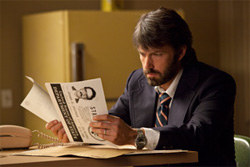
Even those who do remember the story of this sextet don’t know the real turn of events, as international diplomacy and security demanded a fictional spin on the operation. But when the true story was declassified in 1997, it was worth the wait for the details of this crazy covert mission that involved staging a fake sci-fi movie—titled Argo—and passing off the six Americans as a Canadian scouting crew. In other words, movie gold.
Argo opens with a brief history lesson about the Iranian Revolution and the United States’s involvement, then cuts right to the takeover of the U.S. Embassy. It’s a tidal wave of action and tension we ride pretty much until the end of the film. While CIA agents and other national figures are scrambling to concoct a rescue plan, exfiltration specialist Tony Mendez (Ben Affleck) offers their “best bad idea.” He’ll fly in, presumably with his six-person team, to scout Iran as a possible location for Argo, bring the Americans their fake Canadian passports and identities, and then they’ll all fly out 72 hours later. That’s if their whole charade isn’t discovered and they aren’t summarily executed by angry mobs in the street.
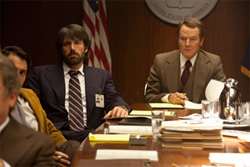
When the CIA top brass begrudgingly green-lights the idea, Mendez sets to work making the film seem as real as possible. He enlists the help of an old makeup artist friend, John Chambers (John Goodman), who turns to veteran Hollywood producer Lester Siegel (Alan Arkin) to find a script, set up an office, create posters and storyboards, and stage events that will provide the best piece of plausibility: media coverage. Their efforts provide surprising bursts of humor amidst the tension and the danger.
The mostly factual screenplay is based on portions of Mendez’s book, The Master in Disguise, as well as the Wired magazine article “The Great Escape.” The pacing is spot on, offering humorous moments when the tension ratchets up, but then deftly cutting to a shot of the hostages in blindfolds or in a dank basement. It’s a theater of the absurd, but always with an eye on the very serious stakes. We’re given personal moments with the “houseguests,” tripping over each other for days on end, as well as the international scope of the incident.
The well-crafted screenplay is given superb treatment by Affleck, who’s at the top of his game here both as a director and an actor. The taut action of both Gone Baby Gone and The Town is eclipsed by Argo. Look for the film, and Affleck, to be remembered at Oscar time.
The rest of the actors—an impressive lot including Bryan Cranston, Victor Garber, Tate Donovan, Kyle Chandler, and the aforementioned Arkin and Goodman—offer compelling, nuanced performances. We feel their despair, their fear, their quiet hope that this crazy plan just might work.
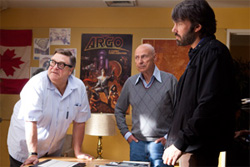
Considering that the story of this mission has been declassified for 15 years, it’s interesting that it’s just now hitting the big screen—as tensions with Iran are again escalating, as relations between our countries are seemingly no better than when this crisis gripped the world, as foreign policy yet again plays a fairly key role in a presidential election. The relevancy of Argo and its underlying themes is sobering.
And its compelling entertainment value is a pleasure. I can’t remember the last time I was in a movie theater audience that clapped. Twice. Even I clapped. It’s that good.
Talk About It
Discussion starters- If you were alive during the Iran hostage crisis, what do you remember from that time? Did you hear about these six Americans?
- List the ways that public perception shapes major decisions both for the better and for the worse in Argo. What role do you think it plays in today’s foreign policy?
- Why did each of the many people involved in this rescue mission take the risk to play a part?
- Discuss the role of fear in the film. Who does it affect and what does it motivate them to do?
- What about the American culture and the Iranian culture made this rescue mission both plausible and implausible?
- Compare the situation between the U.S. and Iran then with the situation between our countries now. What’s different and what’s the same?
The Family Corner
For parents to considerArgo is rated R for language and some violent images. The language is mostly a bunch of F-bombs. And the violence is the obvious shots of the Iranian protestors taking over the U.S. Embassy, blindfolding the Americans, and threatening them in various scenes. We see one man shot at point blank range, and another who’s been hanged. It’s a tense film depicting true events of grave danger and disturbing anti-American sentiment that younger audiences would likely find troubling.
Photos © Warner Bros.
© 2012 Christianity Today. All rights reserved. Click for reprint information.

